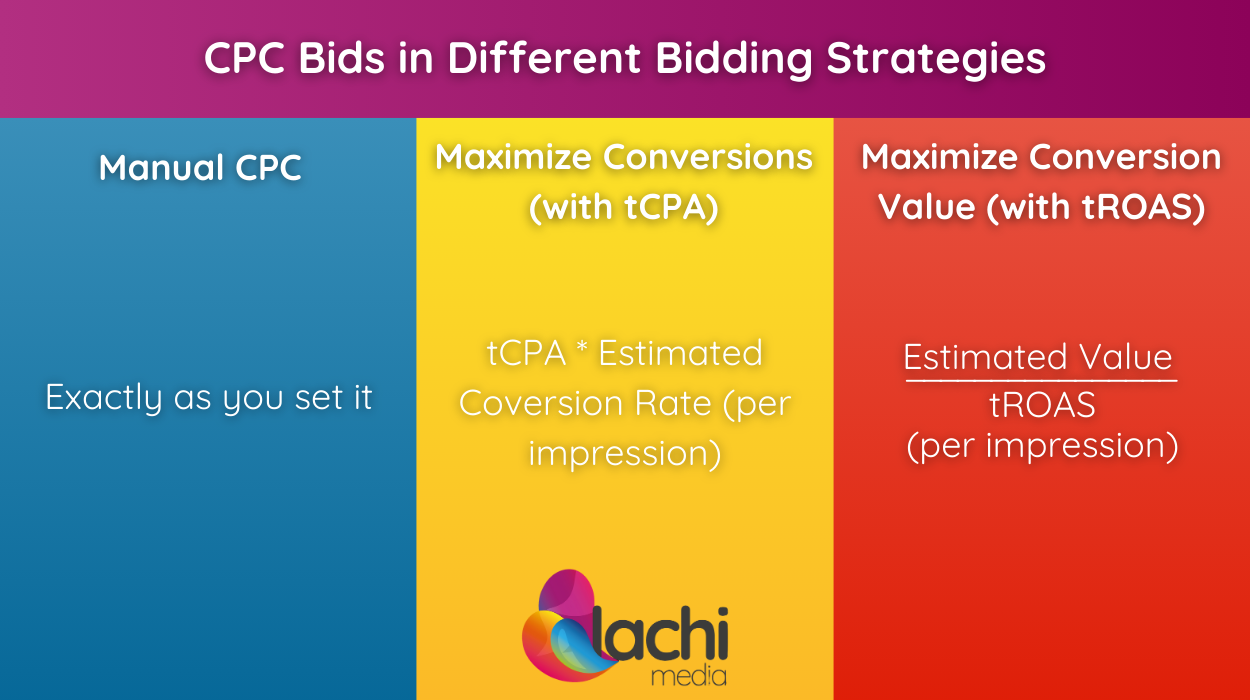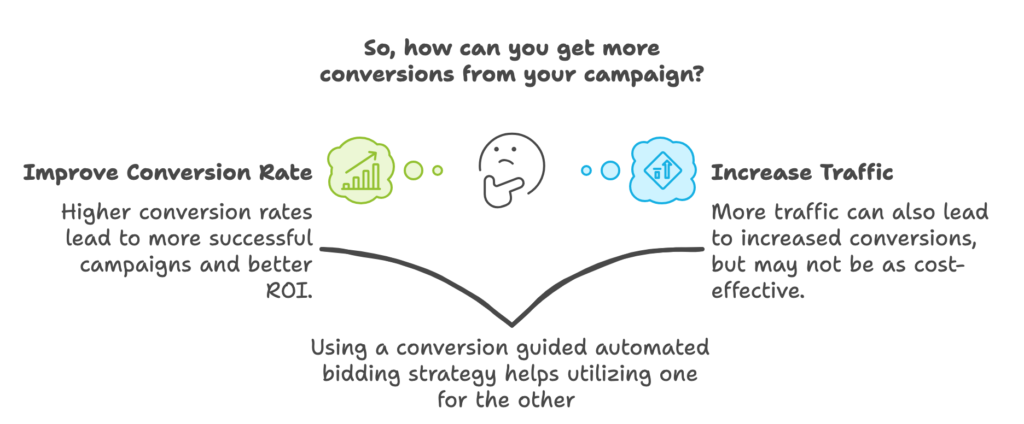Last Updated on August 30, 2025
These days, it’s rare to see a Google Ads campaign running on Manual CPC, but why is that? Of course, it’s easier to use automated bidding strategies, such as Maximize Conversions or Maximize Conversion Value, but are they really better than the good ol’ Manual CPC?
To me, the most interesting question is not only whether Maximize Conversions is a better strategy than Manual CPC but also how changing Google Ads’ entire bidding eco-system towards automated bidding strategies affects how each of us manages our campaigns. What to look out for, and who is the biggest earner? Hint: Google, but as us as well.
Table of Contents
TogglePrice Per Click in Different Bidding Strategies
A few years ago, we all knew the ranking and actual CPC formulas by heart. The Quality Score is multiplied by the Max CPC bid, which gives us the Ad Rank, by which the ads are ranked on the search result page. We also had the ad rank of the ad below us divided by our quality score, plus 0.01, which determined our actual CPC. These are all calculated per auction, by the way, and are still being used today.
But now, most advertisers don’t even use manual CPC (even though we still pay for clicks – mostly). How does everything keep running so smoothly?
This is because even though we use different methods to bid more efficiently, Google still normalizes our bidding strategy to the same base metric: CPC bid.

Maximize Conversions
When running on Maximize Conversion (especially with tCPA – target CPA), our conversion rate is taken into account when entering an auction. A tCPA of $100 with CvR of 8% will get us clicks at ~$8 – and that’s the CPC we’re going into auctions with.
You should look at it as a general guide because each user has a different chance of converting. It depends on the search term, location, and time of day, together with what Google already knows about the user himself, such as his interests, what other searches they performed, and other metrics used to find the overall likelihood of each query for a conversion. This results in a wider range of CPCs for the same keyword.
Maximize Conversion Value
In Maximize Conversion Value, there’s an additional “layer” for the likelihood of a user converting: its worth.
Google estimates the users’ value (taking into account its likelihood to hit that) and divides that by the tROAS. The higher the value or lower your tROAS, the higher the CPC bid you enter the auction with.
A Higher Conversion Rate Becomes an Interest of Google
Since an automated bidding strategy is tied to a campaign’s success, the higher your conversion rate, the more volume you should expect for a given tCPA bid.
Let’s take the same $100 tCPA bid from earlier. If you manage to increase the CvR from 8% to 12%, it “allows” Google to get clicks at $12 instead of $8 and still hit the CPA goal. Assuming you’re not limited by budget, you’ll probably get significantly more volume, as if you raised your Max CPC by 50%, from $8 to $12.
A higher conversion rate has always been important for scaling up campaigns, but it’s more important now than ever.
Real Time Bid Adjustments
Google indeed uses machine learning and its signals to do it in the same way that we can do it manually and achieve the same goal. That being said, a bot is more likely to win when it comes to understanding signals in real-time.
Another interesting observation is that Google advises new accounts to start by creating a campaign using Maximize Conversions. This means that Google may even use signals from other similar advertisers, and not just from within an account.
Automated Bidding vs Manual CPC
Let’s say that two advertisers are running on the same keyword with the same Quality Score:
Advertiser #1 is using manual CPC with a bid of $5. To make it simpler, let’s assume they pay what they bid.
Advertiser #2 is running tCPA bid of $40 with average CvR of 12.5%.
Overall, it’s pretty simple – they’ll both pay $5 per click on average.
However, advertiser #2 will pay more for users who are more likely to convert. This means that a user that Google thinks has a 20% chance of converting will still have a $5 CPC bid from advertiser #1, but advertiser #2 will bid $8 and have a higher chance of getting the click (thanks to a higher Ad Rank).
A user that is only likely to convert 6% of the time would get a lower CPC bid from advertiser #2, $2.4, while, as earlier, advertiser #1 will bid $5 for them.
This means that advertiser #1 will have a competitive edge over advertiser #2 in terms of all of the clicks that are less likely to convert. Sucks, isn’t it?

The Biggest Earners From The Shift to Automated Bidding Strategies
So, let’s look at what happens these days, where the vast majority of advertisers are competing against each other using conversion-guided bidding strategies.
Three advertisers are running on similar keywords with roughly the same tCPA bid:
In each search, Google determines the CPC bid for these advertisers based on their tCPA or tROAS and the user’s likelihood to convert for each. This practically ranks the ads in order of the user’s likelihood to convert for each.
So when there are multiple searches that all advertisers are qualified to show their ads for, each is bidding more competitively for users who are more likely to convert, resulting in a much higher conversion rate. This is even though they did nothing but use an automated bidding strategy. Their average CPC is most likely increased by roughly the same rate, not changing their actual CPA.
Who Earns From the Use of Automated Bidding Strategies?
The advertisers are happy: their ads target users who are likely to buy their services or products rather than waste resources like free trials and sales representatives’ time.
Google is happy: the average CPC rises, making each search more valuable.
Finishing Thoughts
Even though I focused solely on Google Ads in this article, Microsoft is doing the exact same thing on Microsoft Advertising, so the same principle applies, just a bit less accurately and with some nuances.
Automated bidding strategies are worth trying if you haven’t given it a shot already, and if you have and it didn’t work – it’s in your best interest to figure out why. It’s true that Google is not hitting the goal 100% of the time, but it’s important to remember that it takes some time and that tCPA and tROAS are calculated over 30 days.
My Google rep talked me into testing broad match keywords about two years ago instead of my beloved phrase match ones. I’m sorry to say that the broad won the test by a mile. After thinking about it, it was obvious why automated bidding worked so well with the most liberal match type. It’s just using the power of machine learning and data Google has to your advantage. And what does Google get from it? Higher CPC. Everybody wins.